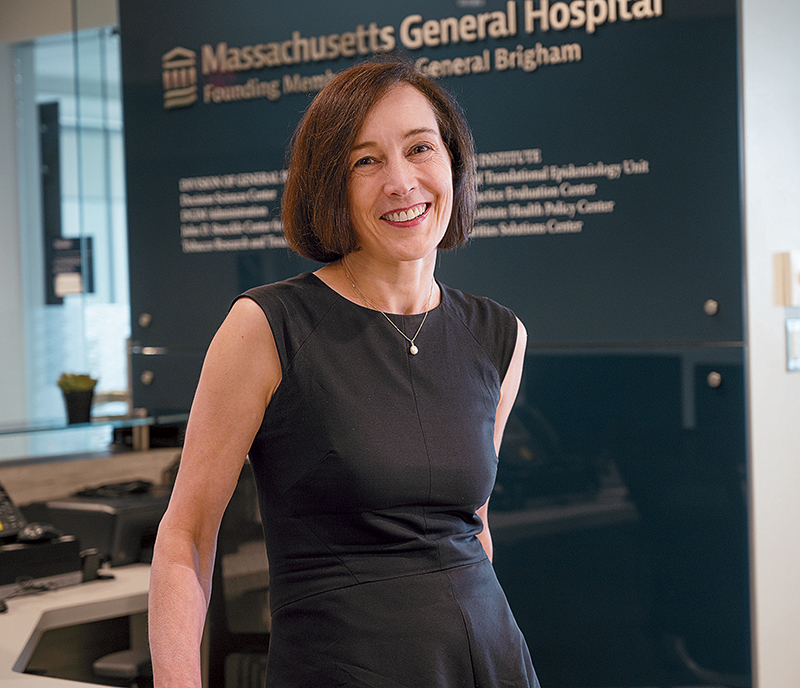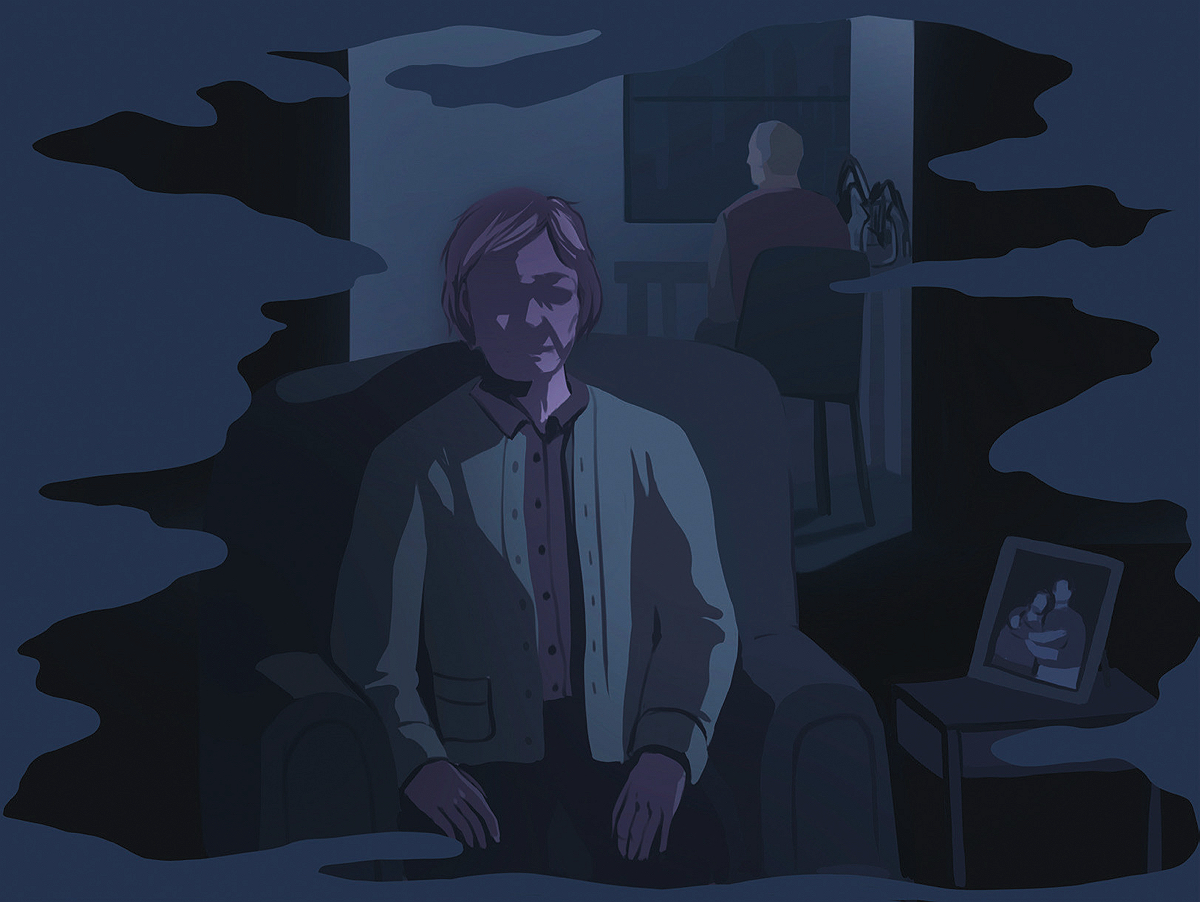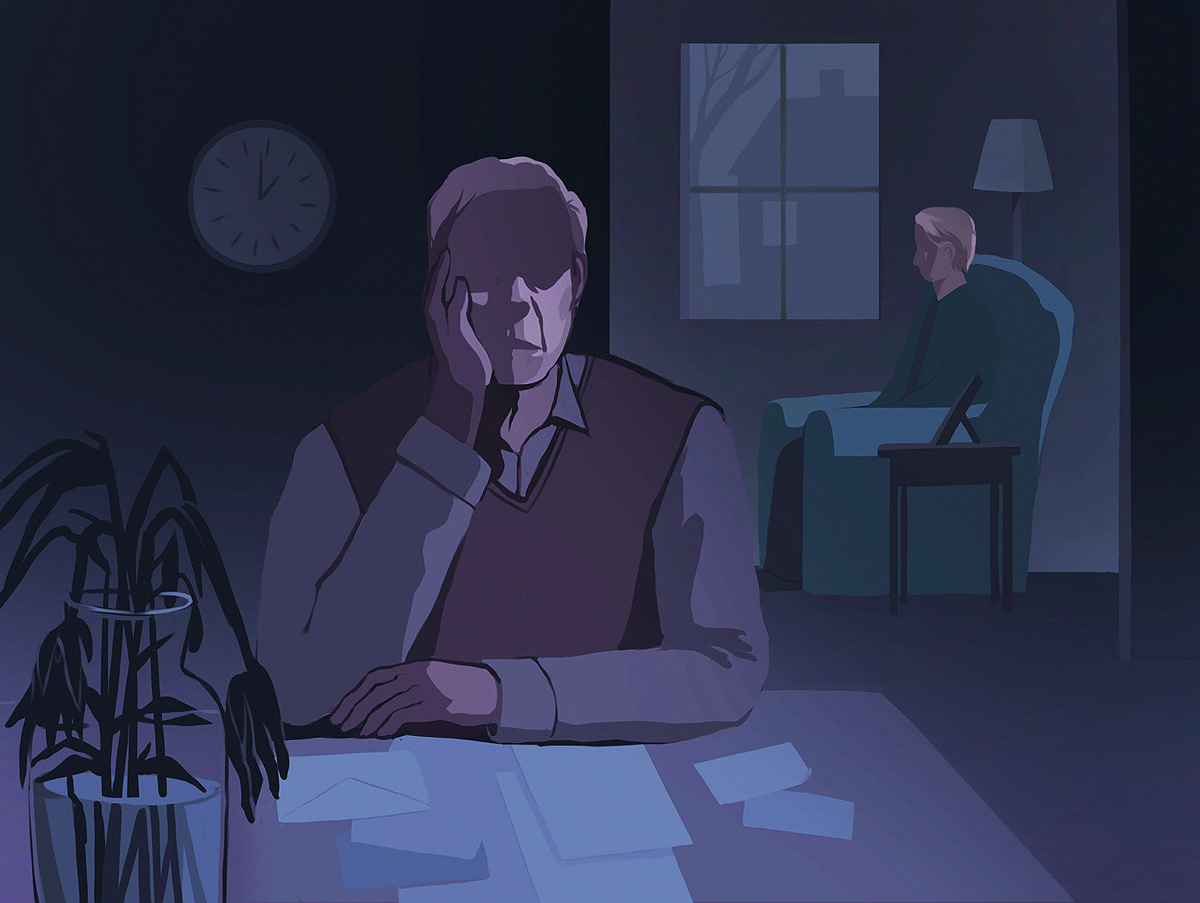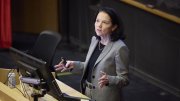Not long after his wife was diagnosed with Alzheimer’s disease, Tom Lee picked up a book on caregiving, one of the many he’d devour in those early, frightening weeks, when the future felt suddenly impossible to imagine. Amid all the information and advice, he read a line that stopped him cold. “It said, make sure you take care of yourself, and leave at least 15 minutes to yourself every day,” he remembers. “I thought, 15 minutes? Are you kidding me? That’s not even enough time to open a book. When I read that, I really started to wonder what I was in for.”
Lee and his wife, Antoinette, have been together for almost 50 years, and married for 43. A plant ecologist, he spent his career at the University of New Hampshire, teaching forestry and conservation biology. She was a stay-at-home mother to the couple’s two sons and then an editor at Rhodora, a journal published by the New England Botanical Society. “She’s a wonderful person,” Lee says. “Very bright, very upbeat—and as stubborn as they come.” The two of them loved hiking and gardening together; they took frequent long walks with friends. The small home in New Hampshire where they have lived for decades, on 15 acres of land a couple of miles outside the nearest town, was designed by Antoinette. “She loves it here,” Lee says. “Although—,” he adds, his voice quieting, “her affection for it is maybe starting to fade a bit now.”
He first noticed something was wrong in 2017, when Antoinette was 69. She started repeating questions and sometimes struggled to grasp complex ideas. For years, she’d done the couple’s taxes, but that fall, for the first time, she had trouble with the calculations. “I sat down with her, and we went over it a dozen times,” Lee says. “And she just couldn’t get it.” By the following summer, they had a diagnosis.
Six and a half years later, she is in what doctors refer to as mid-stage Alzheimer’s. “That’s when things start to really fall apart,” he says. Patients begin forgetting who they are and where they live. They become moody, withdrawn, combative. As their sleep and circadian rhythms unravel, patients sometimes stay up all night, requiring their caregivers to stay up, too. Routine tasks such as getting dressed become difficult without help, and speech gets more confused. “Toni went through a period where about two-thirds of her words were uninterpretable,” Lee says. “They were words she made up, and she would rhyme things as she spoke.” These days, almost nothing she says makes sense. “You ask her if she’s hungry, and ‘no’ could very well mean ‘yes.’” This middle period is also when patients begin to wander, or fall. One day last summer, Antoinette walked away while Lee was out watering tomatoes in the garden. He found her a quarter-mile down the road, talking to a neighbor’s mailbox.
“As a caregiver, you watch bit by bit as your time slips away,” he says, “and then one day you look up and realize that things you once took for granted, like finding an hour to read or listen to music or go for a run—all that’s gone. You become totally absorbed in caring for this person, making sure they are safe and secure and that their basic human needs are met.”
The “Invisible Second Patient”
Across the country, there are more than 11 million people like Tom Lee: unpaid caregivers for someone with dementia. Usually, that someone is a family member or a loved one—the burden falls disproportionately on women—and the majority of caregivers spend one to three years in that role. Often they spend many more.
They are all part of an accelerating crisis. Nearly seven million Americans over 65 have Alzheimer’s, the most common cause of dementia. As the population ages, that number is growing—to a projected 13 million by 2050. During the past decade and a half, following landmark legislation to fight the disease, tens of billions of dollars have poured into the search for a cure; recently, the first drugs aimed at slowing the progress of Alzheimer’s gained Food and Drug Administration approval. Almost any new research on dementia—how it develops, who’s at risk, how it might be prevented—draws assiduous public attention. Yet until recently, caregivers, often described as the “invisible second patient,” have remained largely absent from this conversation, overlooked and understudied.

That’s a problem, says professor of medicine Christine Ritchie, a geriatrician and palliative care physician whose research focuses in part on the needs and experiences of caregivers. Ritchie directs the Dementia Care Collaborative (DCC) at Massachusetts General Hospital (MGH), which provides support and resources to people like Tom Lee, and she sees attention to caregivers as a moral and practical imperative. The dementia crisis is also a caregiving crisis—and the caregiving crisis is getting worse. “Our healthcare system is so fragmented, and it really leaves people adrift,” she says. “We’ve disconnected the biology from the psychology and the social context, and in dementia care especially, those pieces are closely intertwined.”
Arthur Kleinman, a psychiatrist and the Rabb professor of anthropology and professor of medical anthropology, voiced a similar lament in The Soul of Care: The Moral Education of a Husband and a Doctor. The book chronicles the decade he spent caring for his wife with Alzheimer’s (excerpted in “Find My Real Husband,” September-October 2019, page 58). Families, he wrote, “share the experience of the ill person’s state and needs on the most intimate and specific level. Health professionals, by contrast, enter that experience only for brief, fragmented clinical moments, usually without context or meaning, unless they stop long enough to ask, and listen.”
Caregivers navigate not only the round-the-clock demands of keeping a person safe and comfortable, but also intense financial pressures, multiple medical appointments (because dementia patients often have other health problems as well), social isolation, stigma, grief, guilt, anger, exhaustion, and the stress of coping with behavior that changes unpredictably from one day to the next. Caregiving also damages physical health: caregivers often report delaying their own medical needs and are at greater risk for numerous illnesses, including heart disease, stroke, lower immunity—even dementia. “In working with caregivers, I have seen how many times people feel so alone, so disenfranchised,” Ritchie says. “They lack the efficacy to know what to do. And often they don’t have the kind of self-compassion that’s warranted for the difficult journey that they’re on.”
It is a journey Ritchie herself has taken: her father, who suffered from Lewy body dementia, lived with her for two-and-a-half years near the end of his life. David Seel was a surgeon and researcher who spent 37 years as a medical missionary at a Presbyterian hospital in Jeonju, South Korea, arriving with his wife, Mary Seel, a medical technician, in 1953, just after the Korean War ended.

Ritchie and her two siblings grew up in Jeonju, and the cultural values she absorbed there—respect for elders and a deep sense of obligation to the aging—shaped her. At one point her ailing grandmother came to stay with the family. “She was not the easiest person to be a caregiver for, but I was still struck by the fulfillment you could experience in learning from another person’s lived journey, their life story, their being further down the path.” After college, before medical school, she shadowed a nurse practitioner making house calls in the mountains of Kentucky. One day the nurse left her at the home of a woman dying of cancer, with the instruction to “be with these folks while I go take care of more urgent things.” Ritchie was at the bedside when the woman died.
Two decades later, with her father ill, her parents moved in. The period that followed was arduous, and instructive. “Even though I was a geriatrician and a palliative care physician, I was not sufficiently prepared to be a caregiver,” she says: the worry, the grief, the nights spent on alert in case he woke up. Perhaps hardest of all, “I had to become a parent to my father, someone I had adored and looked up to as a mentor my whole life,” she says. He died in 2004.
Meanwhile, in her medical practice, Ritchie saw how palliative care, an approach developed in the 1960s in response to cancer patients’ end-of-life needs, didn’t always fit dementia’s more idiosyncratic and unpredictable course. That observation, and her own lived experience, led her to think more deeply about gaps in clinical knowledge of dementia caregiving. At MGH, where she arrived in 2019 after seven years at the University of California San Francisco (UCSF), Ritchie became research director in the geriatrics and palliative care division. She has spent decades studying the cracks in the health system where caregivers fall through. Her goal is to change how society understands dementia care.
“What Am I Supposed to Do?”
Financial worries magnify every other difficulty for people looking after someone with dementia. In surveys about caregivers’ sources of stress, money routinely tops the list, above the anxiety of coordinating medical appointments or the struggle to take a break, or even their own need for emotional support. Lucy, who lives north of Boston, has been looking after her husband for nine years. (To protect his privacy, she asked to be identified by a pseudonym.) “It’s caused me so many sleepless nights and so much distress,” she says. She thinks about money all the time. “We don’t have long-term-care insurance,” she says, and because her husband receives a small pension from his former job as a teacher, he isn’t eligible for Medicaid.
But the pension isn’t enough to cover care, and Lucy gave up her own job a while ago. “So, what am I supposed to do?” she says. “I feel like all my life energy goes toward keeping him alive and organized and doing what needs to be done to get him through the day. It’s an unbearable toll.” Two years ago, she developed gastrointestinal problems, which her doctor attributed to stress. In extreme moments, she says, “I’ve thought, maybe I’ll just have to commit suicide, so I’ll be out of the picture and he can be taken care of.…I won’t do that, but I can’t make money come out of thin air, and I can’t pay for him to have care with money that we don’t have. I can’t do much long-term planning because we don’t have the assets. So, I just kind of go along and see what’s the next thing that I need to adjust to.”
“Dementia is the condition associated with the highest costs to families in the last year of a patient’s life,” says Ritchie.
Stories like Lucy’s are grimly common, Ritchie says: “Dementia is the condition associated with the highest costs to families in the last year of a patient’s life,” far outstripping other serious illnesses like cancer and heart disease. The average annual out-of-pocket healthcare spending for a senior with dementia is more than $10,000—versus $2,500 for a senior without dementia. The lifetime cost of a patient with dementia (including unpaid caregiving) is estimated to be nearly $400,000, some 70 percent of which is borne by families. The burden falls especially heavily on lower- and middle-income families, and on Latinos and African Americans, groups that are more likely than whites to develop dementia.
One major factor is the way Medicare and other insurancers categorize dementia-related expenses. Costs deemed “medical”—scans, testing, neurology appointments, medications—are covered. But most of the care dementia patients need is “custodial”: someone to help them get dressed, or make sure they eat, or keep them from getting hurt. For this, families pay out of pocket—or do it themselves.
Eventually, most patients require long-term residential care. But assisted living for someone with dementia can cost $100,000 or more per year, and in-home assistance is not only expensive but often difficult to find, given chronic worker shortages and unevenly distributed home-health agencies. A year ago, after his wife’s condition took a bad turn, Tom Lee suddenly realized he “wasn’t going to make it” without help, he says. “I was in a pretty dark place.” But when he started calling agencies, he found that none covered his area. He ended up hiring the daughter of a friend to stay with his wife for four hours a week.
Recently, Antoinette finally reached the point where she needed full-time professional care, and in mid November, Lee moved her to a memory-care facility nearby. Affording this had been a looming anxiety: for years, he had kept a rigid budget of daily expenses, and he estimates that he has enough money now to cover probably four years of care. If his wife lives longer than that, he’ll begin tapping his retirement account. “And after that,” he says, “I have to start thinking about Medicaid.”
Alongside the acute anxiety about money, there is the ache of grief and loneliness. In her research, Ritchie has chronicled how friendships and social networks fall away, even as the disease disrupts relationships between caregiver and patient. For caregiving spouses, depression and loneliness are common, and Ritchie has found that the effect is more prevalent the stronger the marriage is.
Social worker Kyle Kozelka, who leads the DCC’s caregiver-support program, has provided psychotherapy to those looking after a spouse or partner. “We often focus on the later stages of dementia, but even in the earlier stages some really important questions come up around intimacy,” he says. “People seek comfort not only through talking but also through touch, through hugs, through being able to sit close with someone and hold their hand.” As the disease erodes a person’s ability to respond emotionally, these connections become less possible. Meanwhile, medical and safety concerns often mean that spouses who’ve shared a bedroom for 40 or 50 years must begin sleeping separately. “I’ve heard countless stories from caregivers who say, ‘I wish someone would have told me, as we were preparing for this, that that would be the last time I slept in the same bed with my loved one.’”
George, a retired psychologist caring for his husband, has found meaning and validation in the concept of “ambiguous loss,” coined by the social scientist Pauline Boss. It describes a kind of grief that remains uncertain or intangible, present and absent all at once, defying closure. “The truth is, I’ve lost my best friend, and he’s still living in the house with me, and I cook dinner for him most nights,” says George (who asked to be identified by a pseudonym). “We sit at the table, but we don’t talk, because he can’t.” His husband has a slow-moving form of dementia—after seven years, the symptoms remain relatively mild—which has only heightened George’s sense of disconnection. They still don’t have a reliable diagnosis, and for years the couple’s friends insisted that his husband’s cognitive slippage must be simply depression or aging. “You feel like you’re being gaslit,” George says. “Like no one is seeing what you’re seeing.” Among other caregivers he knows, “Everyone has this experience.” It makes them feel profoundly alone.
That separation from the rest of the world becomes a gnawing sadness. Lee says he used to wonder why he felt lonely even after friends would visit. Then he realized: it was because no one wanted to discuss the disease itself. “Even my good friends, even family, avoid talking about it, because it’s uncomfortable and they don’t have any solutions to offer,” he says. He’s sympathetic to their discomfort. “But still, nobody looks you in the eye and says, ‘How the hell are you doing? How are you managing to cope with all this?’ You’re kind of left to tough it out by yourself.”
He knows that very few people can comprehend his daily life. “Most folks just don’t get it,” he says. “This is not a criticism—if I weren’t an Alzheimer’s caregiver, I wouldn’t know either. But, boy, unless you’ve done it 24/7, unless you’ve gotten up in the middle of the night and made that trip to the bathroom to help with every aspect of [using the toilet], or spoon-fed a person day after day, you can’t quite grasp what it is.” He describes caregiving as a kind of crucible: “It’s the hardest thing I’ve ever done. It demands that you look at the world in a different way.”
Countering “A Cloud of Unknowing”
In much of her work, Ritchie studies how the medical establishment often fails dementia caregivers. Jean, who lives in southern Massachusetts, describes the harrowing experience of taking her husband, who has Alzheimer’s, to two different emergency rooms early last fall, seeking treatment for a serious infection in his arm. He became agitated and confused during the hours-long wait, and when the couple were finally seen, she says, the medical staff didn’t know how to deal with his cognitive impairment. They upset him further with instructions and questions he couldn’t follow, and they couldn’t answer her questions about how they’d accommodate his dementia-related needs overnight. “It was horrible,” says Jean (who asked to be identified by her first name only). She took him home against medical advice and pleaded with his primary care physician for an appointment the next day. “Fortunately, he did OK,” she says. “But not everyone has the stamina to fight over and over.”
Complaints about poor or dismissive medical care are common, as are stories about a different anguish, of being left with uncertainty. In 2022, Ritchie and several colleagues published a study detailing patient and caregiver experiences with “anticipatory guidance”—the counsel clinicians give about a disease’s expected course and prognosis, and how to plan for the future. Caregivers described receiving incomplete or hesitant advice, and being asked about advanced-care planning by doctors who then didn’t follow up. “A cloud of unknowing,” was how one study participant summarized the lack of guidance on subjects ranging from behavior and safety to communication problems and financial and legal planning.
There is a limit to how much healthcare providers can relieve the burden—or even the uncertainty—of caregiving. Dementia is a devastating condition with no cure and an unpredictable trajectory. It demands unimaginable, often inhuman sacrifices from caregivers. But there are measures that can help. Ritchie has documented how trained “navigators,” who help families organize and facilitate care, can ease caregiver stress. With Krista Harrison, a UCSF colleague and geriatrics researcher, she has studied how hospice, another innovation developed for cancer care, might be adapted to better fit the needs of families dealing with dementia. And Felipe Jain, an assistant professor of psychiatry and physician at MGH, developed a mindfulness approach, called “mentalizing imagery therapy,” that significantly reduced depression and anxiety among dementia caregivers in randomized trials.
For physicians confronting the difficult task of providing anticipatory guidance, palliative care offers a roadmap, Ritchie says. It is a field deeply focused on communication and on “figuring out what language works and what doesn’t, and being willing to talk about things that are emotionally charged.”
Exploring this idea, she collaborates with assistant professor of medicine Joanna Paladino, a fellow MGH palliative care physician who has designed teaching tools to help providers communicate with patients about serious illnesses. In Paladino’s research, some dementia caregivers describe feeling abandoned by doctors, she says: “After the diagnosis, maybe there was a discussion with some education, maybe a medication was started, but then it was like, ‘All right, come back in X number of months,’ or ‘Here are some resources,’ and that’s it.”
What works better, her studies show, is an incremental process, with conversations spread out over days or weeks. “After a diagnosis is shared, you give space for people to grapple with…what it means,” she says. “Then you ask”—perhaps during a follow-up call—“‘What’s on your mind? What are you most worried about? Would it help to talk about what to expect?’” As the disease changes over time, so should the conversations. “It’s a really powerful thing,” Paladino says, “to feel that sense of partnership, hope, and preparation.”
Questions about guidance and uncertainty also drive another collaborator of Ritchie’s, professor of psychology Ana-Maria Vranceanu, a clinical-health psychologist who studies how clinicians can help strengthen the relationship between caregiver and patient, even in the face of an illness that alters a patient’s personhood. A founding director of the MGH Center for Health Outcomes and Interdisciplinary Research (CHOIR), Vranceanu sees dementia as a “dyadic experience” shared by the patient and caregiver, whose emotions—of distress, guilt, grief—mirror and magnify each other in ways that are essential for clinicians, including therapists, to understand.
That means developing mental health measures that treat patient and caregiver together: administering emotional assessments, teaching emotion-regulation skills like mindfulness and deep breathing, and guiding conversations soon after diagnosis between patient and caregiver about their long-term goals and values in managing the disease. “When you intervene with two people,” she says, “there’s evidence that the effects are higher.”
In contemplating new therapies, it’s also important to know who the caregivers are—and who they will be. Assistant professor of psychology Evan Plys, a CHOIR staff psychologist, examines a growing cohort: dementia patients without spouses or children to care for them. In one study, he found friends, neighbors, roommates, siblings, and ex-partners stepping into the caregiver role. The practical elements of caregiving look the same in these cases, but the emotional challenges can be quite different. Part of his work is designing neutral therapeutic interventions that aren’t tailored specifically to spouses and children.
Another part of Plys’s work is in a new MGH mental health clinic geared specifically toward caregivers. It answers a gaping need. Therapists with expertise in dementia know the illness’s path and can ask caregivers more effective questions in therapy; they are also trained in the family dynamics that come into play in caregiver networks—or in families where a history of trauma, abuse, or estrangement complicates the caregiving relationship. “A lot of folks we see are wondering how to make sense of that,” he says. Others struggle with problems that caregiving exacerbates: anxiety, perfectionism, low self-esteem, or rigid assumptions about one’s role that lead to guilt, self-judgment, and resentment.
Ritchie’s vision for dementia caregiving draws on all these different strands of thought and research. In 2023, she coauthored a New England Journal of Medicine paper, advocating for what she called a “gerineuropalliative” approach to dementia. The idea is to infuse principles from geriatrics and palliative neurology into every aspect of dementia care, from primary care offices and community health centers to specialty clinics and the home. Ritchie describes interdisciplinary care teams, including chaplains, home-health aides, physical and occupational therapists, psychologists, and social workers. Embedded in each team, “care team navigators” would establish dementia-specific protocols and help patients and caregivers maneuver through the system. Making this idea a reality would require new ways of paying for care, she knows. And training the workforce would be formidable.
But Ritchie’s framework aligns with much of what is in a new comprehensive care model that the federal government unveiled last July, called Guiding an Improved Dementia Experience (GUIDE). During the next eight years, the Centers for Medicare and Medicaid Services will be testing it in healthcare facilities nationwide. Ritchie is cautiously hopeful about its impact. “All of us need each other in order to provide better care,” she says, referring to the disparate health professions whose work touches the lives of dementia patients and their caregivers. “It’s not OK to do whatever is the least common denominator.” Taking a cue from palliative care, she says, “The focus should be, What matters to people? How do we optimize quality of life?….How do we help people live as well as they can for as long as they can?”
* * * *
One answer to Ritchie’s question already exists: for decades, support groups have been a crucial source of comfort, community, and information for caregivers who often feel isolated and in the dark. The Dementia Care Collaborative hosts several groups, which constitute a major pillar of its mission. Logging in on Zoom once a month from their kitchens and living rooms in groups of up to 12, caregivers share stories and sorrows. They advise each other on how to persuade a loved one to give up driving, or how to work through an insurance claim; they talk, again and again, about their unfinished, ambiguous grief. Tom Lee participates in a DCC support group, as do George, Lucy, and Jean. “The fact that I’m here today and still can smile, it’s probably because I started going to the support group five years ago,” Lee says. Attendees feel safe expressing emotions that might be too ugly or raw, or fragile, to reveal to the world outside: anger, guilt, burnout, fear. Brokeness. Despair.
“Even though these people are strangers,” says Moscowitz, who leads the support groups, “they immediately connect. They know each other.”
Social worker Barbara Moscowitz, founder and associate director of DCC’s education and support program, coordinates and helps lead the groups. Fifteen years ago, she cared for her own mother through Alzheimer’s. “When you look up at a Zoom screen of 10 people and see everyone nodding, that’s powerful validation,” she says. “Even though these people are strangers”—support group members rarely socialize outside of meetings—“they immediately connect. They know each other.”

Not long after his husband got sick, George made the decision to sell their condominium in the Boston suburbs and move to Cape Cod, where for years they’d had a second home. “He needed the quiet,” George says. “Too much stimulation is terrible for people with dementia, because they don’t filter well. Here, you wake up in the morning and you just hear birds.” There’s a view of the ocean from the second-floor window, and on the small street out front, cars rarely pass. In this serene setting, some of the hardest years of George’s life have unfolded, watching his husband drift slowly into dementia and seeing his own life irrevocably altered, too.
Then, three years ago, he joined a DCC support group and began discovering what feels like a new equilibrium. After 47 years by his husband’s side, he’s making friends on his own and seeking out new interests; he takes acting classes and performed in a Shakespearean comedy. And he vacations alone—the only three weeks to himself every year—while his husband travels separately with a friend.
There is grief and sadness in all these things, but also meaning and growth and survival. George credits the support group for making it possible for him to hold his life open and to digest some of the sorrow. In meetings, he says, Moscowitz “mainly keeps saying to every single person, ‘We know how much you love your spouse. We know what that person was to you, even if they’re not anymore.’… She holds that one kernel, because the rest of us are feeling so guilty, like we’re not doing enough, we’re not loving enough.”
It took him a while to realize that Moscowitz really meant what she was saying to the caregivers—and that she was right. “I’ve come to see that I’m sitting among saints,” he says. “A lot of human beings wouldn’t do this.” But George does it, and so do the others, despite the toll that caregiving takes. “I know how close it comes at times for me to say, ‘I’m done with this,’” he says. “But then I ask: What kind of person do you want to be? And I wake up and do it again the next day, and the next day, and I will until the end.” Suddenly his voice catches in his throat. Then he adds, almost in a whisper, “This is also a part of love.”









